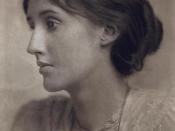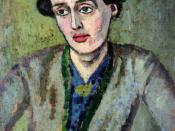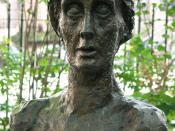In the novel, A Room Of One's Own, by Virginia Woolf it seems implausible that
one could miss the theme behind her writing. Even just by reading the title, it is self-
explanatory. In order for a woman to write fiction she must have money, and a room of
one's own. Woolf stresses this throughout the novel. She directly says "Intellectual
freedom depends upon material things. Poetry depends upon intellectual freedom. And
women have always been poor, not for two hundred years merely, but from the beginning
of time . . .. Women, then, have not had a dog's chance of writing poetry. That is why I
have laid so much stress on money and a room of one's own." As you proceed through
the novel Woolf goes through the work of many poets/writers past. Some including Mary
Carmichael, Jane Austen, George Eliot, and Emily Bronte. Woolf's novel expresses her
feelings on the suppression of women, especially those with the genius for writing, be it
in verse or novel.
Woolf starts her novel by presenting the dilemma she is in, however, the narrator
remains mysterious, "call me Mary Beton, Mary Seton, Mary Carmichael or by any name
you please--it is not a matter of any importance." Nevertheless the argument is presented,
"women and fiction". So the narrator begins her long and tedious thought process. She
starts with a short story to exemplify how women with great talent would be pushed aside
merely on the basis of their gender. The character she produces is Judith Shakespeare,
William's sister, a woman with the genius of Shakespeare, but lacking the recognition.
This woman, knowing her talents were going unnoticed turned to a life less desirable, and
eventually, instead of wasting her life committed suicide. Woolf does this to show the...


